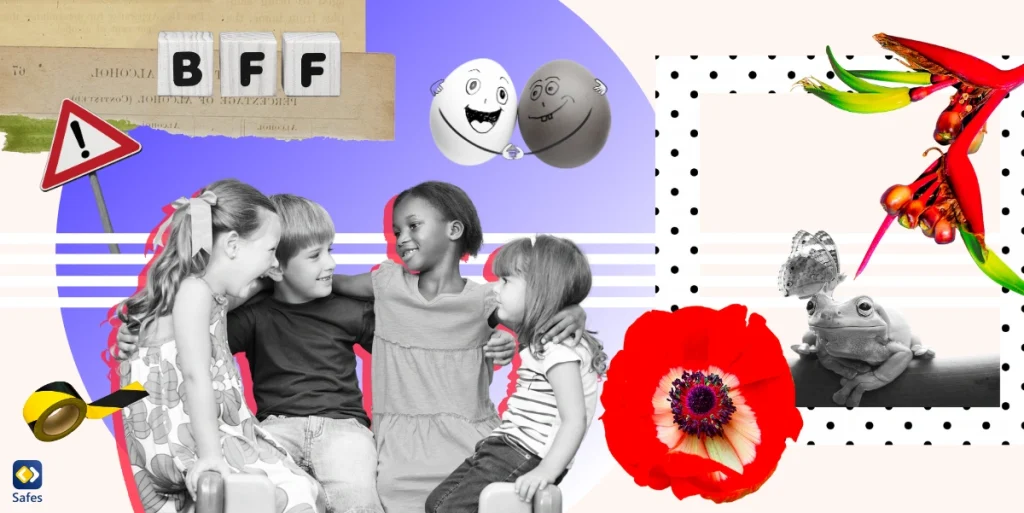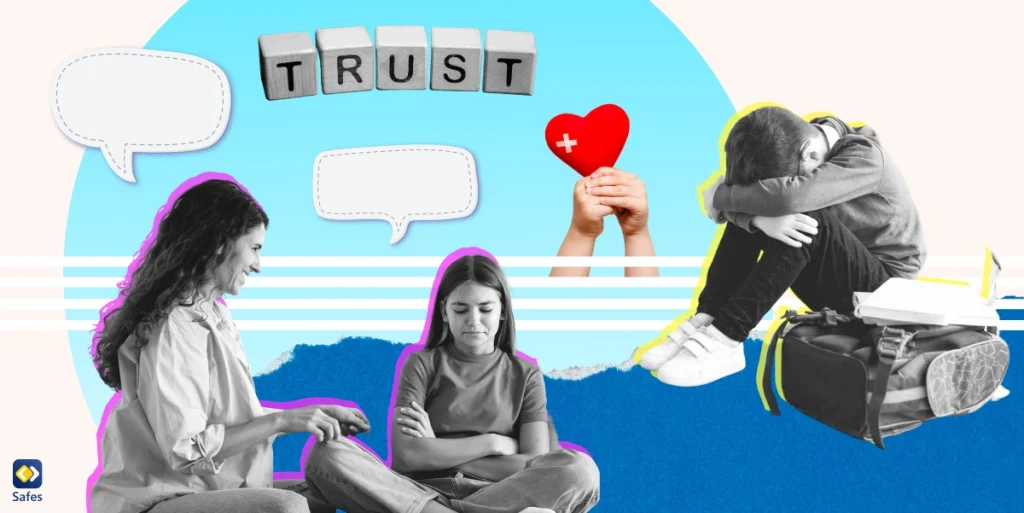Ever seen some tweet written by someone you barely know talking about a personal matter you don’t want to know at all? Before the reign of social media, the worst-case scenario was that one acquaintance or coworker who kept confiding their life details to us; but now, people have the means to write personal notes on social media, and you have no choice but stumble upon them. Don’t see instances of oversharing on social media? Then you’re probably the one who does it!
Download and Start Your Free Trial of the Safes Parental Control App
For adults, oversharing often leads to mere annoyance for people who are not interested in that information. For children though, it can have more serious consequences. That’s why it’s very important to teach children about responsible social media use. In this blog post, we’ll discuss the concept of oversharing, why children do it, and how to stop oversharing.

Understanding Oversharing
What is oversharing? Oversharing refers to the act of divulging personal information on social media. This information can be something intimate that happened to someone, or their experiences or emotions that usually should be kept private or shared with a limited audience.
Why do people overshare? The reason behind oversharing varies from one person to another. One person might be seeking attention or validation, while the other might be trying to alleviate their pain and emotional distress by releasing their emotional load in the vast sea of social media. What is oversharing a symptom of? There has been proof that there’s a positive relationship between anxiety and oversharing. However, to make a credible medical assessment, a doctor’s diagnosis is the first thing you should seek as a parent.
The Risks of Oversharing
What is the impact of oversharing on social media? Social media has provided a platform for people to connect and express their ideas and emotions. However, sharing too much information on social media can negatively affect the people who do it, especially children. Disclosing personal information can expose them to privacy and security risks, such as identity theft and cyberbullying. Additionally, oversharing can have lasting effects on children’s future opportunities and reputations. What we casually share on social media might seem trivial, but the truth is that we leave a digital footprint every time we do something on the internet. One ill-advised post can have implications on our children’s future personal and professional lives.
There is also a negative link between oversharing and boundaries. Sharing intimate information with people who are not close enough with a person can strain relationships by making them uncomfortable or leading to misunderstandings. To prevent children from being exposed to these risks, parents need to take measures to stop oversharing on social media.

Teaching Responsible Social Media Use
What can happen if you share too much information on social media? Your child learns from you to do the same. So, it’s important to model responsible behavior before even attempting to discuss what your child should or shouldn’t share online.
Identifying appropriate and inappropriate content isn’t something children pick from birth; we’re not born with a smartphone in our hands. That’s why parents need to teach their children responsible social media use and setting boundaries. Have a discussion with them about what information is private, and what is okay for other people to hear about. Also, talk to them about why it’s important to protect their privacy and what safety tips they should consider when navigating the online world.
Critical thinking and self-reflection are two important skills that can help children contemplate the content they share online. Therefore, they should be encouraged in children. Read our blog on How to Teach Critical Thinking: Tips & Techniques for Parents to find out how.
Strategies to Stop Oversharing
To stop oversharing on social media, parents need to implement certain strategies for identifying signs of oversharing and understanding personal boundaries. Implementing a “pause and think” approach can help children filter out intimate subjects before sharing on social media. Teach them to ask these questions before hitting the Share button: “Why am I sharing this?” and, “Who is the audience of this post?”
Additionally, most social media platforms have privacy settings that let the user control the audience of the shared content. Teach your children to optimize this setting so that only trusted individuals can see their information.
Lastly, encouraging offline experiences and mindful digital habits can help children appreciate true interactions and friendships. This helps them not feel the need to overshare with people they barely know on the internet and confide in people who truly care about them.
Practical Examples and Discussions
On the 5th of January 2023, a family called the police in Texas to report their 12-year-old daughter missing. She had been chatting and was groomed by a 24-year-old man on Instagram. She was abducted and taken 350 miles away before the police read his license plate and managed to find them. This was a lucky case, but it doesn’t always end like this.
It’s easy to fall into a state of panic and want to break your child’s phone when you read the examples of oversharing on social media and see how they turned out. But that’s not the way to do it. Rather, you should discuss appropriate sharing practices and the importance of setting limits with them. If you suspect that your child is suffering from anxiety, consider seeking help from a professional healthcare provider.
The Role of Parental Control Apps
Proper education is key to staying safe online, but parents can’t solely depend on it. They should stay as involved in their children’s digital lives as possible. Parental control apps are a great tool for monitoring and guiding children’s social media use. A good parental control app lets you monitor your child’s activities on all social media platforms, filter inappropriate content, and set time restrictions. Not only will these apps promote responsible sharing and protect against oversharing, but they also help create opportunities for open communication and building trust between parents and their children. By knowing what their children are doing online, parents can take proactive measures in addressing any potential issues.
Bottom Line
What causes oversharing on social media? A desire to be seen or to lighten the load of an emotional burden. Oversharing on social media, however, can have far-reaching consequences that extend beyond the virtual realm. It is crucial to teach children about responsible social media use, setting boundaries, and protecting their privacy. By understanding the risks associated with oversharing, implementing practical strategies to stop oversharing, and utilizing parental control apps as tools for guidance, we can foster a culture of mindful and responsible sharing. By encouraging ongoing conversations and involvement in children’s digital lives, we can equip them with the necessary skills to navigate the social media landscape safely and responsibly.
Your Child’s Online Safety Starts Here
Every parent today needs a solution to manage screen time and keep their child safe online.
Without the right tools, digital risks and excessive screen time can impact children's well-being. Safes helps parents set healthy boundaries, monitor activity, and protect kids from online dangers—all with an easy-to-use app.
Take control of your child’s digital world. Learn more about Safes or download the app to start your free trial today!




